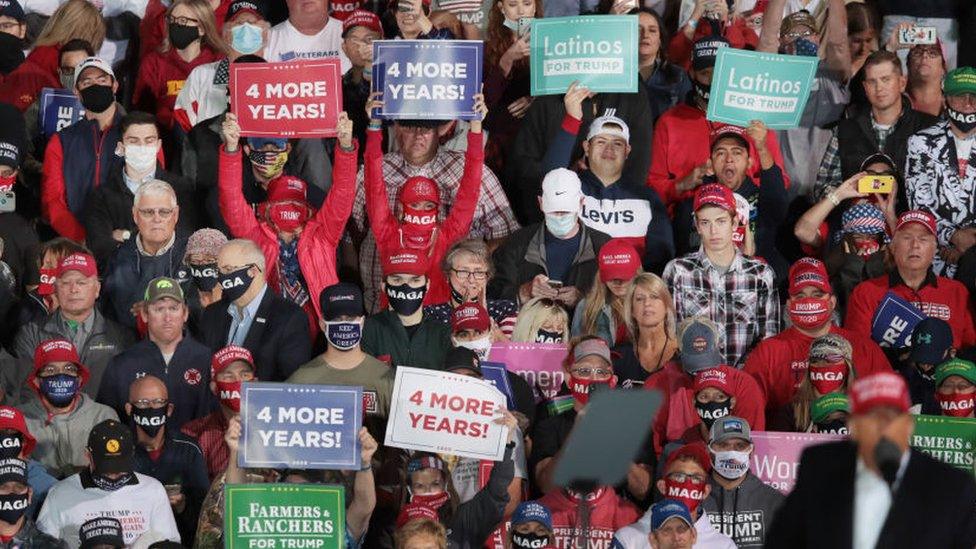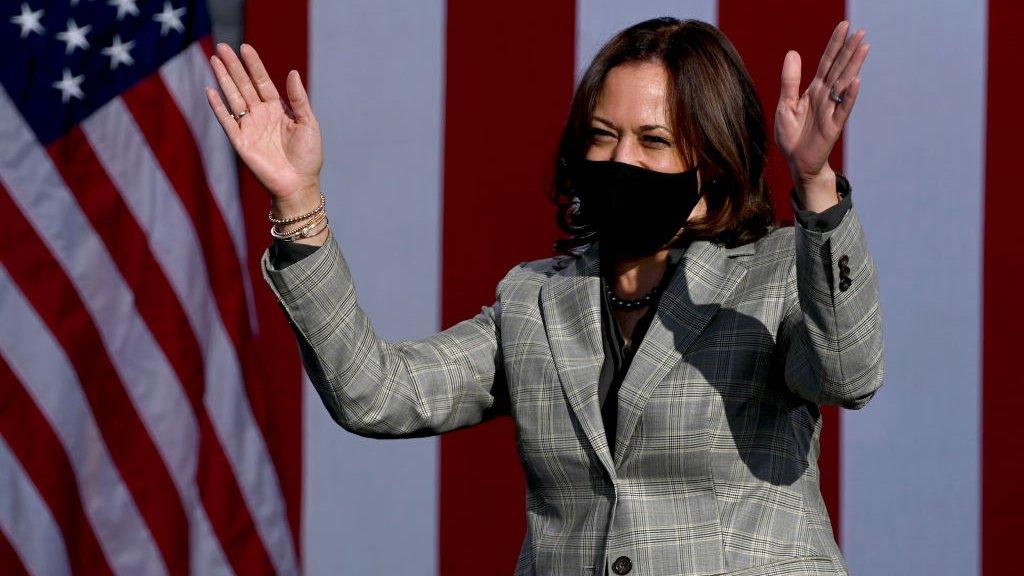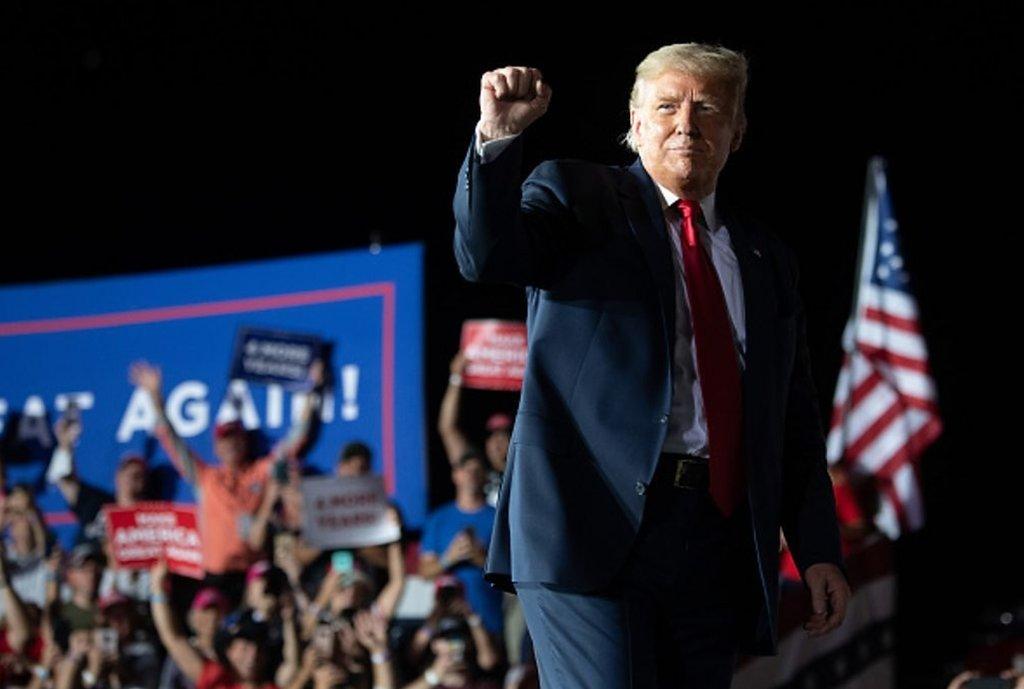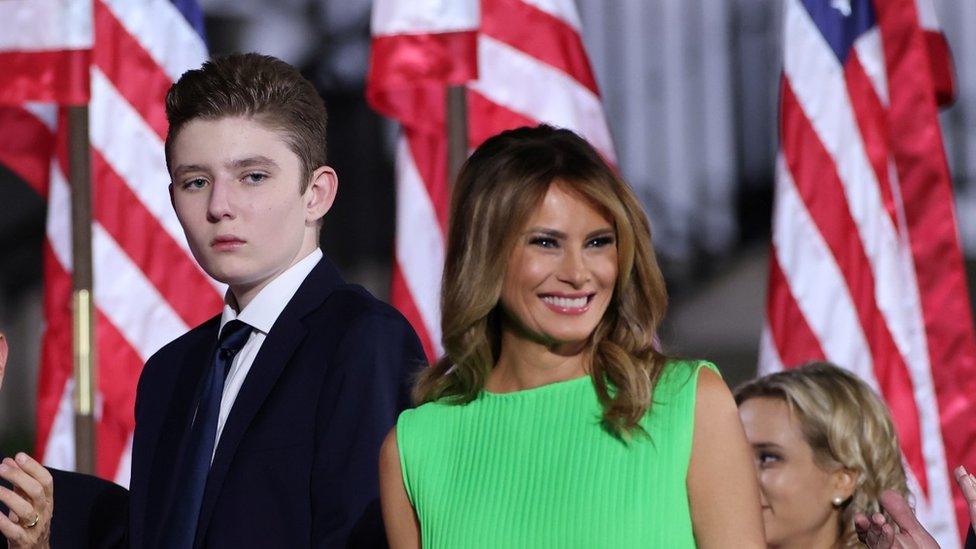How President Trump can still win the US election
- Published

Recent polls suggest Joe Biden has a significant and steady lead over Republican Donald Trump in this year's presidential race in both national preference and key swing-state surveys.
Due to record-shattering fundraising, the Democrat also has a sizeable financial advantage, which means he'll be able to blanket the airwaves with his campaign message in the final weeks.
Electoral analysts have been increasing their odds that Trump will lose his re-election bid. Nate Silver's Fivethirtyeight.com blog currently has Biden with an 87% chance of winning, while Decision Desk HQ puts him at 83.5%.
If all of this is painfully familiar to Democrats, it should be. At a similar point four years ago, Hillary Clinton was also predicted to have a high likelihood of victory. They remember how that turned out.
Could history repeat itself with another Trump victory? If the president is taking the oath of office once again in January, here are five possible reasons why it happened.
Another October surprise
Four years ago, just 11 days before the election, FBI Director James Comey disclosed that his agency was reopening an investigation into Clinton's use of a private email server while secretary of state. For a week, related stories dominated the headlines and gave the Trump campaign room to breathe.
With just over two weeks before polls close in 2020, a similar seismic political event might be enough to propel Trump to victory.
So far, at least, the big surprises this month have been bad news for Trump - such as the revelation of his tax returns and his hospitalisation for Covid-19.

Hunter Biden and his father, then Vice-President Joe Biden, in 2016
A New York Post article about a mysterious laptop containing an email that might link Joe Biden to his son Hunter's efforts to lobby for a Ukrainian gas company has been billed by some conservatives as such a campaign earthquake - but its questionable provenance and lack of specificity means it's unlikely to sway many voters.
Trump has promised that there's more to come, however. If this is just an opening salvo, setting up direct evidence of wrongdoing by Biden while vice-president, that could be a different, bigger story.
Or perhaps there's another, wholly unanticipated and shocking campaign development that's just about to burst.
If we could predict it, it wouldn't be a surprise.
The polls are wrong
Practically since Biden secured the Democratic Party's presidential nomination, national polls have given him a steady lead over Trump. Even in key swing states, which have shown a tighter race, Biden has demonstrated a consistent lead frequently outside the margin of error.
As 2016 demonstrated, however, national leads are irrelevant and state-level polls can miss the mark.
Predicting what a presidential electorate will look like - that is, who will actually show up to cast a ballot - is a challenge in every election, and some pollsters got it wrong last time, undercounting the number of white, non-college-educated voters who would turn out for Trump.
Can we believe the polls this time?
Although the New York Times predicts Biden's current margins would protect him from even a 2016-level misfire, pollsters have some new obstacles to overcome in 2020.
Many Americans, for instance, are planning to vote by mail for the first time. Republicans are already promising to aggressively challenge mail-in ballots to prevent what they say could be the potential for widespread fraud - something Democrats have said is really an effort at voter suppression.
If voters fill out their forms incorrectly or do not follow proper procedure, or there is delay or disruption in mail delivery, it could lead to otherwise valid ballots being discarded. Understaffed or limited in-person polling places could also make it more difficult to vote on election day, discouraging Americans who had been considered by pollsters to be "likely voters."
A debate turnaround
The dust has now settled from the first presidential debate between Trump and Biden more than two weeks ago, and the president is the one who got the dirtiest.
Polls indicate Trump's aggressive, interrupting style didn't play well with suburban women, who are a key voting demographic in this campaign. Meanwhile, Biden held up adequately under fire, assuaging concerns among voters - played up by Republicans - that he had lost a step in his advancing age.
"Shut up, man" and other insults and interruptions from the first debate
Trump missed an opportunity to change his first-debate impressions when he backed out of the second scheduled debate because it had been switched from in-person to a "virtual format". He'll have one more chance on the big stage next Thursday and will have to make it count.
If Trump presents a calmer, more presidential demeanour and Biden comes unglued or has some particularly dramatic gaffe, the balance of the race could possibly tilt in Trump's favour.
A swing state sweep
Even with polls showing an advantage for Biden, there are enough states where Trump is ahead or within the margin of error that - if things break just the right way for the president - the Electoral College arithmetic could work out for him.
Even though Trump lost the national popular vote last time around, he had a comfortable margin in the Electoral College, where each state gets a number of votes based on their population.
Who really decides the US election? A look at which voters matter
Some of the swing states he won - like Michigan and Wisconsin - seem to be out of reach this time. But if he can claw out narrow victories in the rest, turning out even more white non-college voters in places like Pennsylvania and Florida, he can reach the 270 electoral votes necessary to win the White House.
There are even scenarios where he and Biden each get 269 votes, creating a tie that would be decided by the state delegations to House of Representatives, a majority of which would probably side with Trump.


A Biden fumble
Biden has run a remarkably well disciplined campaign so far.
Whether it's by design or due to the realities imposed by the coronavirus pandemic, a candidate known to be gaffe-prone has been able to largely stay out of the spotlight and avoid situations where his mouth can get him in trouble.
But Biden is now hitting the campaign trail in earnest. With more exposure comes a greater risk of saying or doing something that costs him at the polls.
What do young Democrats think of Joe Biden?
Biden's electoral coalition is a hodgepodge of suburban moderates, disaffected Republicans, traditional working-class Democrats, ethnic minorities and liberal true believers. That's a lot of different and conflicting interests that could be stirred to anger if he gives them reason to.
Then there's the chance that, under the fatigue of the campaign trail, Biden shows his age and again raises concern about whether he is up to the task of being president. If he does, the Trump campaign will be poised to pounce.
The Biden campaign may feel it just has to run out the clock, and the White House will be theirs. But if they stumble, they wouldn't be the first political team to find a way to snatch improbable defeat from the jaws of what seemed certain victory.
Related topics
- Published15 October 2020

- Published13 October 2020

- Published15 October 2020

